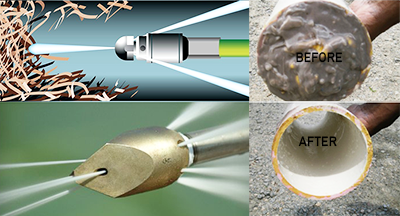Whether it’s a residential home, commercial building, or municipal sewer system, unclogging and maintaining drains is an essential part of plumbing. Over time, all drainage systems accumulate grease, debris, tree roots, and mineral deposits that can obstruct flow. Left unaddressed, blockages in sewer lines and drains can cause problems like back-ups and overflows.
Sewer jetting is a highly effective method for clearing obstructions and restoring full flow capacity to drain pipes. Also known as hydro-jetting or high-pressure water jetting, it involves using a high-powered water stream under pressure to remove accumulated waste and buildup from inside pipes. This guide will provide an overview of common sewer jetting techniques, best practices for routine drain maintenance, and how jetting services can keep wastewater infrastructure operating smoothly.
Sewer Jetting Equipment
At the center of any sewer jetting operation is the jetting machine and customized nozzle attachments. Jetting trucks typically house self-contained units that house jetting pumps, high-pressure hoses, monitors, and other equipment needed for the job.
Pumps are capable of generating water pressures anywhere from 1,500 to over 4,000 PSI (pounds per square inch), depending on the application. This high-powered stream is forced through specialty nozzles designed for different sewer line conditions and blockage types. Common nozzle styles include:
- Rotating Nozzles: Containing jetting jets that spin at high RPMs for scouring built-up deposits off pipe walls. Effective for heavier accumulations.
- Non-Rotating Nozzles: Straight water jet streams that blast blockages with precision. Ideal for negotiating bends and locating specific problem areas.
- Hydro-Kinetic Nozzles: Centrifugal nozzles that use water vortex action to break up and flush out debris. Particularly suited to flushing out tree roots.
- Sewer Balls/Pigs: Inflated devices of varying sizes that are blasted down pipes to scrape away gunk as they travel. Useful add-ons for difficult problems.
Electronic video inspection cameras are also commonly integrated with jetting units. This allows technicians to visually inspect pipes before, during, and after cleaning to pinpoint and address all issues.
Jetting Techniques
Experienced crews employ a range of jetting techniques tailored for various pipe conditions and blockage types:
For heavy accumulation in large sewer mains, rotating nozzles may be utilized in a two-pass cleaning method. The first pass uses high pressure to break upbuildup. The second pass at lower psi scoops residue out through manholes.
- Hydro-kinetic nozzles and sewer balls are effective tools for tackling stubborn tree roots penetrating cracked pipes. The vortex action and scraping capabilities help dislodge intrusive roots.
- Grease buildup in commercial kitchen lines responds well to non-rotating precision jets targeted at problem spots. High pressure dissolves grease clogs without damaging pipe infrastructure.
- For locating blockages in unknown areas of a system, inspectors first conduct video surveys. Jetting nozzles are then accurately positioned under camera guidance to target identified blockages.
- Periodic flushing maintenance of entire drainage networks employs dragging techniques. Lower pressure continuous jets are dragged methodically through all connected pipes to prevent light accumulation.
- Proper jet nozzle selection, pressure levels, and application techniques are essential for safe and successful clearing of various pipe conditions. Experienced technicians are adept at strategizing the best jetting approach based on blockage type and system characteristics.
Drain Maintenance Best Practices
While sewer jetting is relied upon to clear more serious drain obstructions, proactive maintenance practices can prevent many blockages from occurring in the first place. Some recommended strategies include:
- Develop a routine semi-annual or annual cleaning schedule for all wastewater pipes through jetting or rodding. Catching light buildups early forestalls larger problems.
- Routinely inspect and clean grease traps and interceptors serving restaurants and food service businesses. These are prime locations for preventable clogs to form.
- Monitor low-flow areas prone to solid settling through video surveillance. Target preventive cleaning to these inactive sections.
- In residential systems, avoid dumping fats, oils, grease, and improper items down drains and toilets which can lead to clogs.
- Promptly address any signs of drainage backup, slow flow, or overflow to stop minor issues from worsening.
- Conduct periodic video inspections of entire pipe networks to look for structural defects allowing infiltration before they cause collapse.
- Routinely trim tree roots near older clay or concrete sewer lines prone to root penetration through cracks.
- Consider a semi-annual drain snaking/jetting maintenance contract for busy commercial facilities with high FOG generation.
Proper drainage system upkeep is most cost-effectively achieved through a combination of preventive jetting/rodding and reactive jetting as needed to clear any blockages caught too late. This life-cycle maintenance approach maximizes flow and drainage system longevity.
Conclusion
As an integral part of effective drain maintenance strategies, sewer jetting has proven an indispensable tool for clearing clogs and restoring full flow capacity to wastewater lines. Experienced jetting technicians equipped with specialized high-pressure pumping equipment and tools are able to tackle a wide range of pipe obstructions.
Through employing the right jetting techniques targeted at blockage composition, accurate video-guided pipe diagnosis, and development of routine preventive cleaning schedules, drainage infrastructure performance and longevity can be optimized. With proactive maintenance focusing on both preventive jetting and quick response to signs of backups, many sewer system issues can be averted at their earliest stages.

